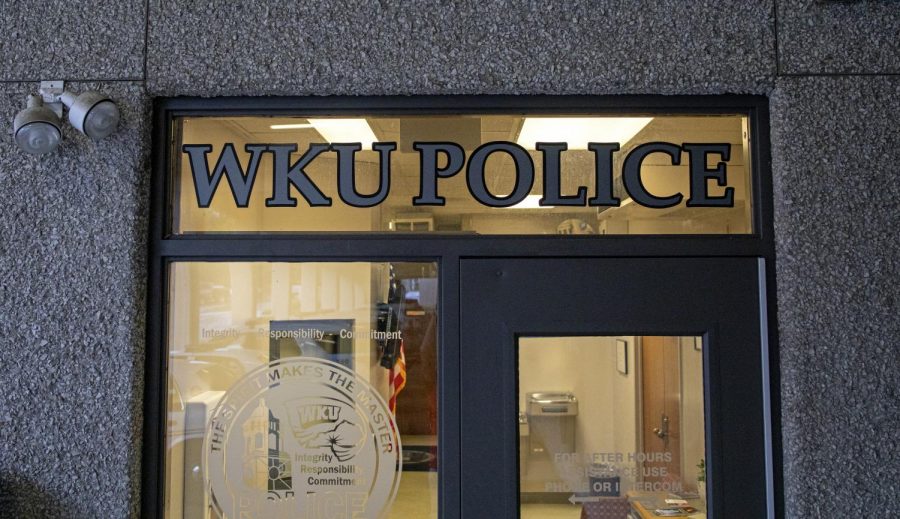Residence halls see increase in police presence
September 24, 2019
Police officers have been assigned to residence halls as part of an officer liaison program created by the WKU Police Department and Housing and Residence Life.
Earlier in the Fall 2019 semester, HRL began telling its staff about the program, which has caused concern for resident assistants and other students.
The program will last the entire academic year and has already started.
HRL and WKUPD have both described the plans as proactive rather than reactive, and both stated the program’s purpose is to strengthen the relationship between WKUPD officers and WKU students, faculty, staff and community members.
“It gives the students the opportunity to engage in dialogue with our officers on a peaceful level to where they can get to know that officer and where they can address concerns that they might have,” WKUPD Public Information Officer Tim Gray explained.
Gray said the officers’ presence in the residence halls would not be constant, but they would have a minimum of one check-in per week for each hall assigned to them. The officers will be able to check in an unlimited amount.
“Officers go, they check in with the front desk, see if there are any issues that the front desk is aware of, and they’ll conduct a walkthrough of the building,” Gray said.
In addition, Gray explained WKU’s 15 residence halls would be split into three sections of five, each with a sergeant assigned and designated officers. Another point of engagement where the officers would join with the residence halls is educational programming.
“They’re making contacts with residents,” Gray said. “Residents are getting to know the men and women beyond the uniform, they’re seeing if there’s any issues in the building.”
Gray said the frequency of these check-ins could be affected by the volume of calls WKUPD receives in a particular week or in a particular shift and that most of the officers will be assigned two halls, though there are some will only be assigned one.
He also said the purpose of the officer liaison program was not to have an officer around every corner but to instead improve the relationship between the WKUPD and WKU’s student population.
“When we’re talking with students, community members, faculty and staff, one of those things that is often heard is civilians talking about the discomfort that they feel when police are around,” Gray said.
“The narrative that we want to create is that things must be well if the police officers are just here hanging out, things must be just fine if the police officers are here,” Gray said.
Mike Reagle, executive director for Housing and Dining, shared Tim Gray’s sentiment that the program is not reactive but proactive.
“If you look at the philosophy of our university police department, it’s all about community policing, and community policing is about developing relationships,” Reagle said. “It’s about how we have relationships with people in the community so that if there are issues, if there are things that come up, people feel like they can go talk to that person because they know them.”
Reagle stated that the whole basis of this program is HRL and students on campus continuing to develop relationships with the WKUPD and improving WKUPD job satisfaction by giving officers more opportunities to interact with students.
“Police officers who come to work for the university tend to be a little bit different than ones that might work someplace else, and part of that difference is they care about students,” Reagle said.
Reagle said with around 4,500 students living on campus, students aren’t going to get to know all of the police officers. This presented a challenge that led to the new officer liaison program. Reagle also said students are more likely to present problems they have to an officer that they know.
“Police officers tend to be intimidating,” Reagle said. “That’s just the nature of when you see someone walking up with a police uniform on carrying a gun.”
Reagle said that the sight of an armed officer is often very intimidating for students who have never had an interaction with a police officer before or who may have had a more negative interaction with a police officer.
“Anything we can do to break down those stereotypes, to break down the barriers in that relationship, the better off everybody is,” Reagle said.
News reporter Abbey Nutter can be reached at 270-745-6011 and [email protected]. Follow her on Twitter at @abbeynutter.



















![Students cheer for Senator at Large Jaden Marshall after being announced as the Intercultural Student Engagement Center Senator for the 24th Senate on Wednesday, April 17 in the Senate Chamber in DSU. Ive done everything in my power, Ive said it 100 times, to be for the students, Marshall said. So, not only to win, but to hear that reaction for me by the other students is just something that shows people actually care about me [and] really support me.](https://wkuherald.com/wp-content/uploads/2024/04/jadenmarshall-600x422.jpg)



